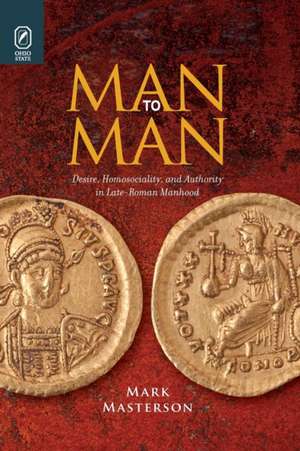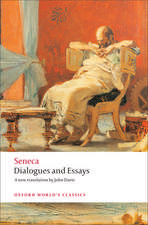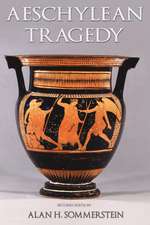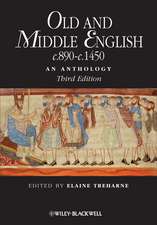Man to Man: Desire, Homosociality, and Authority in Late-Roman Manhood
Autor Mark Mastersonen Limba Engleză Paperback – 31 mai 2016
In an analysis that promises to be controversial, Man to Man: Desire, Homosociality, and Authority in Late-Roman Manhood surveys the presence of same-sex desire between men in the later Roman empire. Most accounts of recent years have either noted that sexual desire between men was forbidden or they have ignored it. This book argues that desire between men was known and that it was a way to express friendship, patronage, solidarity, and other important relationships among elite males in late antiquity. The evocation of this desire and its possible attendant corporeal satisfactions made it a compelling metaphor for friendship. A man’s grandeur could also be portrayed metaphorically as sexual attractiveness, and the substantial status differences often seen in late antiquity could be ameliorated by a superior using amatory language to address an inferior.
At the same time, however, there was a marked ambivalence about same-sex desire and sexual behavior between men, and indeed same-sex sexual behavior was criminalized as it had never been before. While rejection and condemnation may seem to indicate a decisive distancing between authority and this desire and behavior, authority gained power from maintaining a relation to them. Demonstrating knowledge of the actual mechanics of sex between men suggested to a witness that there was nothing unknown to the authority making the demonstration: authority that knew of scandalous masculine sexual pleasure could project its power pretty much anywhere.
This startling dissonance between positive uses of same-sex desire between men and its criminalization in one and the same moment—a dissonance which recent discussions have been unable to address—requires further investigation, and this book supplies it.
At the same time, however, there was a marked ambivalence about same-sex desire and sexual behavior between men, and indeed same-sex sexual behavior was criminalized as it had never been before. While rejection and condemnation may seem to indicate a decisive distancing between authority and this desire and behavior, authority gained power from maintaining a relation to them. Demonstrating knowledge of the actual mechanics of sex between men suggested to a witness that there was nothing unknown to the authority making the demonstration: authority that knew of scandalous masculine sexual pleasure could project its power pretty much anywhere.
This startling dissonance between positive uses of same-sex desire between men and its criminalization in one and the same moment—a dissonance which recent discussions have been unable to address—requires further investigation, and this book supplies it.
Preț: 321.30 lei
Nou
Puncte Express: 482
Preț estimativ în valută:
61.48€ • 64.19$ • 50.88£
61.48€ • 64.19$ • 50.88£
Carte tipărită la comandă
Livrare economică 31 martie-07 aprilie
Preluare comenzi: 021 569.72.76
Specificații
ISBN-13: 9780814253014
ISBN-10: 0814253016
Pagini: 236
Dimensiuni: 152 x 229 x 15 mm
Greutate: 0.35 kg
Ediția:1
Editura: Ohio State University Press
Colecția Ohio State University Press
ISBN-10: 0814253016
Pagini: 236
Dimensiuni: 152 x 229 x 15 mm
Greutate: 0.35 kg
Ediția:1
Editura: Ohio State University Press
Colecția Ohio State University Press
Recenzii
“Masterson has written something bold and provocative. Something important is being said, and a debate needs to take place about this mode of reading and these questions. Even those who want to disagree with it will be forced to think hard about their own positions.” —Erik Gunderson, professor of Classics, University of Toronto
Notă biografică
Mark Masterson is Senior Lecturer of Classics at Victoria University of Wellington, New Zealand.
Cuprins
Introduction
-Summary of This Book’s Contents
-Prospect for This Book
-Two Men: Setting the Scene
-Law and the Knowingness of Authority
-A Metaphor for Admirability
-Summation and Prior Scholarship on Late-Roman Manhood
Chapter One • Emperor Julian’s Marcus Aurelius
-Introduction
-Platonic Glamour in the Caesares
-Saloustios and Julian on the Proper Use of Myths
-The Making of Julian’s Authority in Against Heracleius
-Ioulianos Mythoumenos
-Conclusion
Chapter Two • Athanasius’ Antony
-Introduction
-Sources and Athanasius’ Métier
-Antony the Legible
-Figuring Antony
-Two Treatises
-Conclusion
Chapter Three • Ammianus’ Emperors
-Introduction
-Adventus
-Imperial Signature
-Aeternitas in the Res Gestae and Beyond
-Not a Civil Emperor
-Declinatio and Emperor
-Conclusion
Conclusion
-Summary of This Book’s Contents
-Prospect for This Book
-Two Men: Setting the Scene
-Law and the Knowingness of Authority
-A Metaphor for Admirability
-Summation and Prior Scholarship on Late-Roman Manhood
Chapter One • Emperor Julian’s Marcus Aurelius
-Introduction
-Platonic Glamour in the Caesares
-Saloustios and Julian on the Proper Use of Myths
-The Making of Julian’s Authority in Against Heracleius
-Ioulianos Mythoumenos
-Conclusion
Chapter Two • Athanasius’ Antony
-Introduction
-Sources and Athanasius’ Métier
-Antony the Legible
-Figuring Antony
-Two Treatises
-Conclusion
Chapter Three • Ammianus’ Emperors
-Introduction
-Adventus
-Imperial Signature
-Aeternitas in the Res Gestae and Beyond
-Not a Civil Emperor
-Declinatio and Emperor
-Conclusion
Conclusion
Descriere
Surveys the presence of same-sex desire between men in the later Roman empire.


















